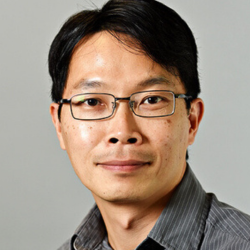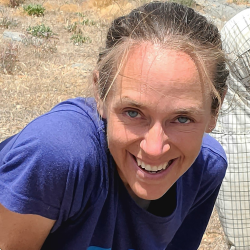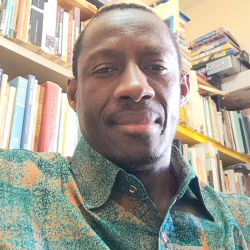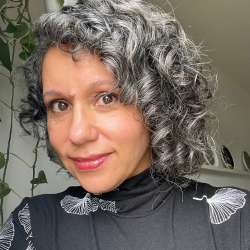The JHI is pleased to announce the Chancellor Jackman 12-month Faculty Research Fellowships in the Humanities for 2024-2025.
Twelve-month Faculty Research Fellows hold an office on the 10th floor of the Jackman Humanities Building and are central members of the Circle of Fellows. They are University of Toronto tenured faculty members by the time of their fellowship, chosen for their distinction in achievements relative to their career stage, the excellence of their proposed project, and its relation to the annual theme for 2024-25, Undergrounds/Underworlds.
Undergrounds have figured powerfully in human histories and imaginations as places of alterity, concealment, exploration, and discovery; of fear, transition, transportation, and transmutation. They have also figured as spaces of hope, refuge, and fugitivity that weave them into radical traditions and visions of the future. From the Epic of Gilgamesh, through the Greek katabasis and Dante, to crime rings and chthonic gods, infrastructures and escape routes, DJs and the Dark Web: our languages are fascinated with depth. But our surface worlds depend crucially on subterranean networks of extraction, exploitation, and disposal. Now more than ever, we need to understand the place of underworlds in human pasts, presents, and futures. This JHI theme encourages proposals that examine what a descent into the underworlds might reveal.
12-Month Faculty Research Fellows
- Tong Lam, Associate Professor, UTM Historical Studies—Secrecy as Spectacle: Dust, Sand, and Cloud in China’s Atomic Age
- Sarah Murray, Associate Professor, A&S Classics—Descending through Hephaistos’ Sooty Realm: Metallurgy, Pyrotechnology, and Death Ritual in Early Greece
- Ato Onoma, Professor, A&S Political Science—Mobility, Faith, and Segregated Cemeteryscapes
- Karina Vernon, Associate Professor, UTSC English—Black Noise: Wayward Listening in the Black Prairies’ Sonic Archives
Tong Lam
UTM Historical Studies
 Tong Lam’s research utilizes methods of critical infrastructure studies, media studies, and science and technology studies (STS) to examine the politics and poetics of mobilization in China’s special zones in the socialist and postsocialist eras. He also practices research-based visual art to uncover hidden evidence of state- and capital-precipitated violence—both fast and slow—across various contexts. In so doing, he aims to foster a dialogue between his research and creative practices. He is the author of the monograph A Passion for Facts: Social Surveys and the Construction of the Chinese Nation-State, 1900-1949 (Asia-Pacific Modern Series, UC Press, 2011) and Abandoned Futures: A Journey to the Posthuman World (Darlington, UK: Carpet Bombing Culture, 2013), a photo-essay book. His research-based visual projects have been exhibited internationally.
Tong Lam’s research utilizes methods of critical infrastructure studies, media studies, and science and technology studies (STS) to examine the politics and poetics of mobilization in China’s special zones in the socialist and postsocialist eras. He also practices research-based visual art to uncover hidden evidence of state- and capital-precipitated violence—both fast and slow—across various contexts. In so doing, he aims to foster a dialogue between his research and creative practices. He is the author of the monograph A Passion for Facts: Social Surveys and the Construction of the Chinese Nation-State, 1900-1949 (Asia-Pacific Modern Series, UC Press, 2011) and Abandoned Futures: A Journey to the Posthuman World (Darlington, UK: Carpet Bombing Culture, 2013), a photo-essay book. His research-based visual projects have been exhibited internationally.
Fellowship Research Project—Secrecy as Spectacle: Dust, Sand, and Cloud in China’s Atomic Age
My monograph explores the history of China’s nuclear secret cities from their inception to early 1970s, a crucial phase of China’s involvement in the global Cold War nuclear arms race. The underground, both in its physical and figurative senses, played a pivotal role in the everyday life of these exceptional spaces designated for uranium extraction and enrichment, research and development, and bomb testing. As these underground cities underwent transformation themselves, they also transformed the human and nonhuman worlds aboveground, with profound and lasting consequences. Built on my research, I will also employ lens-based methods to document the afterlives of these national sacrifice zones, including selected nonnuclear secret cities in China, the former Soviet Union, and the US from the Cold War period.
Sarah Murray
A&S Classics
 Sarah Murray is an archaeologist and historian whose research examines the socioeconomic institutions of early Greece. She received a Ph.D. in Classics at Stanford University in 2013. She is the author of The Collapse of the Mycenaean Economy (Cambridge, 2017) and Male Nudity in the Greek Iron Age (Cambridge, 2022) and single- or co-authored articles and reports in scholarly journals including the Journal of Field Archaeology, Journal of Archaeological Research, American Journal of Archaeology, Hesperia, Antiquity, Mouseion, and Journal of Archaeological Science: Reports.
Sarah Murray is an archaeologist and historian whose research examines the socioeconomic institutions of early Greece. She received a Ph.D. in Classics at Stanford University in 2013. She is the author of The Collapse of the Mycenaean Economy (Cambridge, 2017) and Male Nudity in the Greek Iron Age (Cambridge, 2022) and single- or co-authored articles and reports in scholarly journals including the Journal of Field Archaeology, Journal of Archaeological Research, American Journal of Archaeology, Hesperia, Antiquity, Mouseion, and Journal of Archaeological Science: Reports.
Fellowship Research Project—Descending through Hephaistos’ Sooty Realm: Metallurgy, Pyrotechnology, and Death Ritual in Early Greece
The Greek Early Iron Age witnessed the emergence of two cultural novelties: the invention of iron metallurgy and the use of cremation burial. This project proposes that the two developments are best understood as closely intertwined elements within an emergent ideology of fiery transformation related to the invention of iron smelting. The project draws on comparative evidence to highlight the supernaturally fraught position of metallurgical transformation in a wide range of premodern societies. By centering the dark, hot underworld of ancient Aegean miners and smiths, my project offers a new theory about the origins of some Greek eschatological beliefs.
Ato Onoma
A&S Political Science
 Ato Kwamena Onoma’s current work examines mobility, identity, belonging, and inter-communal relations through the prisms of epidemics and phobia, and the faith-based segregation of interment spaces. He is the author of two books with Cambridge University Press: The Politics of Property Rights Institutions in Africa (2009) and Anti-Refugee Violence and African Politics (2013). He has previously taught at Yale University and worked with CODESRIA. He holds a bachelor’s degree in philosophy from the University of Ghana and a doctorate in Political Science from Northwestern University.
Ato Kwamena Onoma’s current work examines mobility, identity, belonging, and inter-communal relations through the prisms of epidemics and phobia, and the faith-based segregation of interment spaces. He is the author of two books with Cambridge University Press: The Politics of Property Rights Institutions in Africa (2009) and Anti-Refugee Violence and African Politics (2013). He has previously taught at Yale University and worked with CODESRIA. He holds a bachelor’s degree in philosophy from the University of Ghana and a doctorate in Political Science from Northwestern University.
Fellowship Research Project—Mobility, Faith, and Segregated Cemeteryscapes
Why do some towns in Senegal operate segregated cemeteries that each receive the dead of only one faith while other localities privilege open cemeteries that receive the dead of all faiths? I argue that open cemeteries occur in localities where the spread of world religions led to religion crosscutting and attenuating differences based on origins. Segregated cemeteries resulted in communities where the spread of world religions led to religion overlapping and reinforcing cleavages based on origins. I use this excavation of cemetery and urban histories along the Upper Guinea Coast to broach broad questions of mobility, identity, and inter-communal relations.
Karina Vernon
UTSC English
 Karina Vernon researches and teaches in the areas of Canadian and Black Canadian literature, archives, critical pedagogy, and Black-Indigenous relations. She is editor of The Black Prairie Archives: An Anthology (WLUP 2020) and a companion volume, Critical Readings in the Black Prairie Archives, which is forthcoming. She is the co-editor, with Winfried Siemerling (UWaterloo) of Call and Response-ability: Black Canadian Works of Art and the Politics of Relation (McGill-Queens, forthcoming), which offers a Black Canadian theory of reception and relation.
Karina Vernon researches and teaches in the areas of Canadian and Black Canadian literature, archives, critical pedagogy, and Black-Indigenous relations. She is editor of The Black Prairie Archives: An Anthology (WLUP 2020) and a companion volume, Critical Readings in the Black Prairie Archives, which is forthcoming. She is the co-editor, with Winfried Siemerling (UWaterloo) of Call and Response-ability: Black Canadian Works of Art and the Politics of Relation (McGill-Queens, forthcoming), which offers a Black Canadian theory of reception and relation.
Fellowship Research Project—Black Noise: Wayward Listening in the Black Prairies’ Sonic Archives
In “Black Noise: Wayward Listening in the Black Prairies’ Sonic Archives” I follow the reverberations of Black noise and music emerging from what Fred Moten and Stefano Harney call the undercommons—the fugitive spaces where Black lives have so often been lived in the contexts of anti-Black social orders—to locate unruly, unarchivable sonic and embodied materials that exist in the shadow of dominant archives. Specifically, this project develops a method of “wayward listening,” or, listening relationally, to the eighteenth- and nineteenth-century repertoire of Black voyageurs and cowboys, to produce an uncommon sonic prairie archive.


